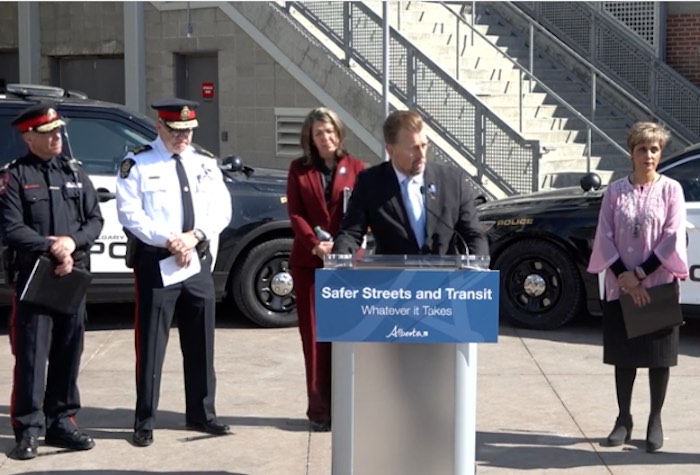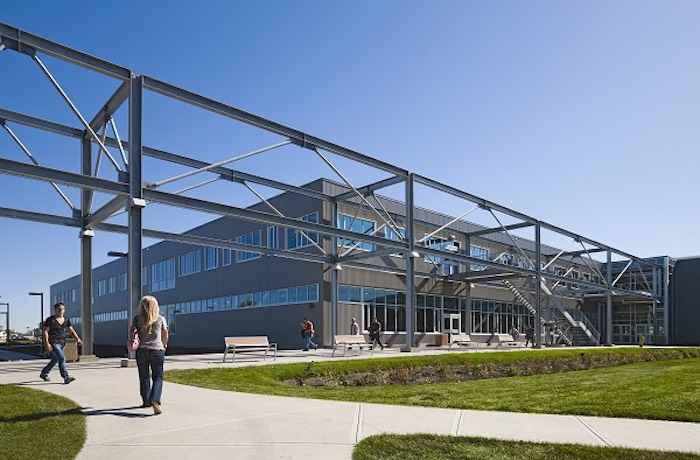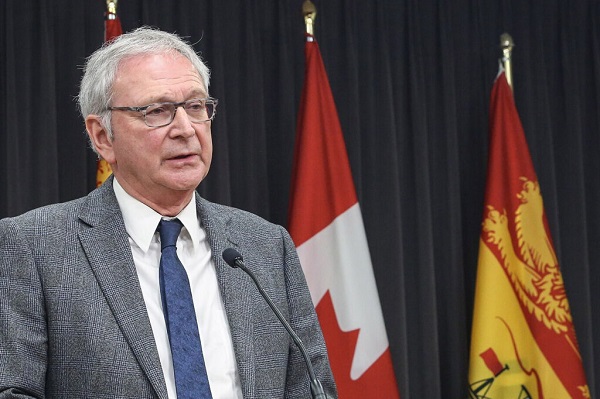Alberta
Transit safety and violent crime: Enough is enough

Alberta’s government is taking action to restore order and improve public safety in response to increasing crime and disorder in the province’s big cities.
In both Edmonton and Calgary, criminal activity is on the rise. Between July 2022 and January 2023, Edmonton’s LRT and transit centres experienced an increase in violent criminal incidents of 75 per cent. In Calgary, overall criminal occurrences at LRT stations increased 46 per cent between 2021 and 2022.
Premier Danielle Smith has directed Public Safety and Emergency Services Minister Mike Ellis to work with his cabinet colleagues to develop a plan to hire 100 more street-level police officers over the next 18 months to increase the visible law enforcement presence and tackle criminal activity in high-crime locations in Calgary and Edmonton.
“Safety on public streets is never negotiable. We can address root causes like mental health and addiction at the same time, but we will not compromise on security for all Calgarians and Edmontonians. This starts with the federal government reforming its broken catch-and-release bail system and includes us working with cities and police services to fight back against criminals.”
In addition to increasing the number of street-level police officers on city streets, Alberta’s government is encouraging the City of Calgary and the City of Edmonton to transfer command and control of transit peace officers to the Calgary and Edmonton police services. This transfer would enable the police to better lead a coordinated and strategic response to the increase in violent crime on public transit.
“Enough is enough – the rising crime levels in Edmonton and Calgary are unacceptable. Albertans have a right to use public transit and walk the streets without fear. We are working with our partners to develop a clear plan to take our cities back from those who seek to cause harm.”
Improving public safety on the cities’ transit networks also involves stations and vehicles that are clean of drug paraphernalia and debris. Through a new $5-million grant to each city, municipal governments will be able to provide the services needed to keep station platforms and vehicles clean, safe and welcoming for law-abiding Calgarians and Edmontonians.
“The safety and security of our transit systems and downtowns will remain a top priority. No single order of government can solve this issue alone. We will continue to work together by deploying our safety resources in an integrated and collaborative way.”
“We are seeing a significant portion of those who are improperly using transit and other public spaces becoming entrenched, with many displaying resistance to offers for services, as well as reduced cooperation and compliance with authority figures. For those people, consequences will follow.”
Police and crisis teams
As part of building strong recovery-oriented systems of mental health and addiction care, Alberta’s government is investing almost $8 million over three years to increase the number of police and crisis teams (PACT) in Calgary and Edmonton. PACT pairs police constables with mental health therapists from Alberta Health Services to respond to 911 calls where there is a mental health concern. Police and mental health therapists work together to assess a client’s mental health challenge and determine what support is required to keep the individual and the community safe.
“We are taking a fair, firm and compassionate approach to keeping our communities safe while treating mental health and addiction as health-care issues. By working with our partners in the Calgary and Edmonton police services, we can connect people in need with critical mental health services and better address the social issues affecting our two largest cities.”
With this funding, Alberta’s government is adding 12 new PACT partnerships in each city. This will double the number of PACT teams in Calgary, increasing from 12 to 24, and triple them in Edmonton, increasing from six to 18. These partnerships will better support Albertans struggling with mental health challenges while improving public safety for everyone.
“These additional resources will help us to gather what we need to get ahead of the concerning spike in crime and particularly violent crime that we are witnessing in areas like our downtown core and transit stations across Edmonton. The support, not just for police but for PACT, means prioritizing those who need support while ensuring appropriate focus on safety. Centring police as leaders within this work shows a key understanding that we cannot have well-being if we don’t have safety.”
Quick facts
Edmonton crime:
- The average crime severity index in downtown Edmonton has increased 29 per cent, to 116 in December 2022 from 90 in July 2022, driven primary by an increase in serious criminal offences, in particular second-degree murder, assault causing bodily harm with a weapon, robbery and aggravated assault.
- In Edmonton, a person is about twice as likely to be victimized by a stranger at a transit centre than for the city as a whole (70 per cent at LRT transit versus 36 per cent citywide).
Calgary crime:
- Property crime occurrences in Calgary nearly doubled – increasing 95 per cent to 463 in 2022, up from 238 in 2021.
- Total calls for service to Calgary LRT stations increased to 9,317 in 2022, up 39 per cent from 6,706 in 2021.
- Public-generated calls for service to LRT stations increased to 5,012 in 2022, up 20 per cent from 4,160 in 2021.
- Officer-generated calls for service to LRT stations increased to 4,305, up 69 per cent from 2,546 in 2021.
PACT facts:
- Police and crisis teams (PACT) offer mental health assessment, support and/or consultation in crisis situations. Mental health therapists work with police constables to assess mental health needs and determine appropriate action in accordance with the Mental Health Act and the criminal justice system.
Alberta
Expansion planned for Centre for Innovation in Manufacturing at Red Deer Polytechnic

Investing in innovation at Red Deer Polytechnic |
Alberta’s government is expanding student capacity and creating a modern learning environment at Red Deer Polytechnic that will help graduates succeed in the economy of tomorrow.
To support emerging opportunities for students, Alberta’s government will invest $12.9 million to expand the Centre for Innovation in Manufacturing Technology Access Centre (CIM-TAC) at Red Deer Polytechnic (RDP). CIM-TAC is an applied research and innovation centre that gives companies access to state-of-the-art prototyping and manufacturing equipment, along with a multi-disciplinary team with the expertise to turn brilliant ideas into market-ready products.
As Alberta’s economy grows and diversifies, job creators will increasingly seek employees with the skills required to work in advanced manufacturing.
Construction will begin in early 2025 and will increase the centre’s applied research, education and training capacity. The expanded CIM-TAC will grow to provide work-integrated learning opportunities for an estimated 450 post-secondary students and training through workshops and events to an additional 2,000 students annually by 2030. Additionally, more than 500 junior and senior high school students will take part in dual credit programs at the CIM-TAC.
“Investing in this expansion of CIM-TAC will give students at RDP access to cutting-edge technology and skills to succeed in the economy of tomorrow. The strategic investments we’re making in Budget 2024 are part of a forward-looking path to support the goals of our post-secondary institutions, grow Alberta’s economy and create jobs.”
“The expansion will allow Alberta-based manufacturers across multiple sectors to have greater ability to develop, test and scale their ideas. Students will be engaged at the forefront of made-in-Alberta technologies and manufacturing solutions.This investment will help meet high demand from entrepreneurs and industry for applied research and will take the facility beyond its current capabilities to become an advanced technology training and hands-on learning centre.”
“This expansion project will build on the CIM-TAC’s 15 years of success and leverage the centre’s industry partnerships and manufacturing expertise to provide even more capacity for applied research, as well as education, training and work-integrated learning opportunities for students. We thank the Government of Alberta for this investment that will benefit not only RDP students and researchers, but also the entire central Alberta region and its critical industries like health care, agriculture, energy and construction.”
“Manufacturing and advanced manufacturing are driving job-creation, economic growth and made-in-Alberta solutions that improve the lives of people around the world and right here at home. The funding to expand RDP’s CIM-TAC is an investment that will allow Alberta companies greater access to the tools, technology and next generation of skilled talent that will allow our industry to solve real-world challenges, develop better products and ultimately increase productivity.”
Quick facts
- The expansion of CIM-TAC at RDP will support a variety of sectors through advanced manufacturing capabilities, including energy innovation, transportation, aviation and agriculture. The centre will also support RDP’s future expansion into more medical device manufacturing and health-care innovations to support both patients and providers.
- RDP’s expansion of the CIM-TAC will grow the facility’s footprint from 15,000 square feet to 25,000 square feet.
- The CIM-TAC currently houses $7.6 million of advanced manufacturing equipment.
- In 2022, RDP attracted more than $2 million in applied research investment. RDP also completed 64 projects for 57 companies and participated in more than 1,300 engagements with industry partners.
- Since the CIM-TAC’s inception in 2009, RDP has supported more than 300 industry partners (including repeat clients).
Alberta
Parent and gender dysphoria groups granted intervenor status in New Brunswick school policy case

News release from the Justice Centre for Constitutional Freedoms
The Justice Centre for Constitutional Freedoms is pleased to announce that two groups, Gender Dysphoria Alliance and Our Duty Canada, have been jointly granted intervenor status in a constitutional challenge to a New Brunswick education policy. The policy requires that parents be notified when their child intends to undergo a gender transition by using a different name and pronouns at school.
On August 17, 2020, the New Brunswick government created Policy 713, which prohibited teachers from informing parents that their child had adopted a new name or pronouns at school (unless the child consented to such disclosure).
On June 8, 2023, the government changed the policy to require that parents of students under 16 years of age be notified by the school before the formal use of a different name or pronoun. “Formal” refers to the use of names and pronouns in the classroom and in school records.
The change to Policy 713 brought a firestorm of criticism and media coverage because it was the first of its kind in Canada to support parental rights on this issue. New Brunswick Premier Blaine Higgs stated that he believes he has the support of parents in the province on this issue.
The Canadian Civil Liberties Association (CCLA) brought a constitutional challenge against the Province of New Brunswick as represented by the Minister of Education and Early Childhood Development, on September 6, 2023. The CCLA argues that Policy 713 infringes the students’ rights to freedom of expression, to equality, and to life, liberty and security of the person.
“The Canadian Civil Liberties Association has filed a court challenge against the right of parents to be fully informed about what is happening with their own children at school,” stated John Carpay, President of the Justice Centre.
“The Supreme Court of Canada explained in B.(R.) v. Children’s Aid Society of Metropolitan Toronto that the parental interest in bringing up, nurturing and caring for a child, including medical care and moral upbringing, is an individual interest of fundamental importance to our society,” continued John Carpay.
On May 2, 2024, Justice Richard Petrie of the New Brunswick Court of King’s Bench granted intervener status to two groups: Gender Dysphoria Alliance is comprised of transsexual adults who seek to promote an evidence-based approach to gender dysphoria. Our Duty Canada is a peer support network for parents of children struggling with gender dysphoria and transgender ideation. As intervenors, they now have the right to present evidence to the court. The Justice Centre is providing for the legal representation of both groups, which seek to uphold the constitutionality of the amended Policy 713.
Prior to granting intervenor status, on March 5, 2024, Justice Petrie ordered that any proposed intervenors file the evidence they intend to present.
Gender Dysphoria Alliance and Our Duty Canada submitted the following testimonies as evidence:
- The written testimony of a New Brunswick mother whose child underwent a social transition in school, about which she was not informed;
- The written testimony of a young woman from Alberta who began to adopt new pronouns at school without her parents’ knowledge; she ultimately reversed course (detransitioned) after her parents became aware of her situation and were able to assist her;
- The written testimony of the young woman’s father.
Karin Litzcke of Our Duty Canada says, “[Our] members are pleased to have an opportunity to contribute to the development of jurisprudence in this area. What has happened to us could happen to any parents under policies that promote secrecy from families. We are grateful to the Justice Centre for its assistance in advocating for the interests of children and parents in court.”
Speaking on behalf of Gender Dysphoria Alliance, Aaron Kimberly says, “The Gender Dysphoria Alliance is pleased with the decision to grant us intervention status in this case. We believe New Brunswick’s policy is an important safeguarding measure for children experiencing gender incongruence, since we know that most kids with this experience turn out to be gay or lesbian, not trans. Prematurely labelling kids “trans” and socially transitioning them is a psychosocial intervention that risks putting pre-gay kids onto an unnecessary medical pathway.”
Hatim Kheir, lawyer for both groups, says, “The Supreme Court has affirmed that parents in Canada have the right to guide the moral upbringing of their children. This case provides an opportunity for the Court to apply those rights to issues surrounding gender which are becoming increasingly relevant in our society.”
-

 Brownstone Institute10 mins ago
Brownstone Institute10 mins agoBook Burning Goes Digital
-

 conflict3 hours ago
conflict3 hours agoOver 200 Days Into War, Family Of American Hostage in Gaza Strives For Deal To Bring Son Home
-

 COVID-192 days ago
COVID-192 days agoBritish MP Andrew Bridgen gives powerful speech on ‘scandal’ of excess deaths after COVID jab rollout
-

 Fraser Institute2 days ago
Fraser Institute2 days agoPolicymakers in Ottawa and Edmonton maintain broken health-care system
-

 Censorship Industrial Complex2 days ago
Censorship Industrial Complex2 days agoElon Musk skewers Trudeau gov’t Online Harms bill as ‘insane’ for targeting speech retroactively
-

 Alberta2 days ago
Alberta2 days agoParent and gender dysphoria groups granted intervenor status in New Brunswick school policy case
-

 MAiD2 days ago
MAiD2 days agoEven Canadian leftists are starting to recognize the ‘dystopian’ nature of MAiD
-

 Business1 day ago
Business1 day agoSaudis evict locals with lethal force to build ‘green’ city in line with globalist goals: report






